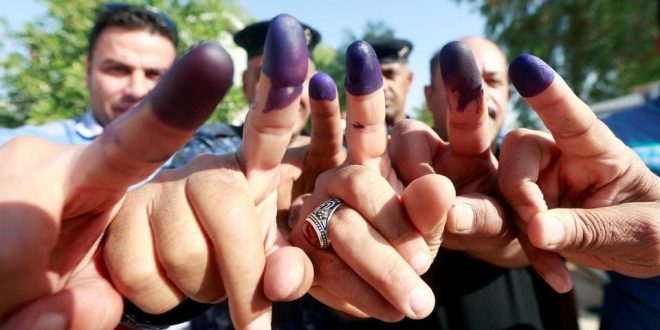10-10-2021
BAGHDAD: Iraqis headed to the polls for an early election billed as a concession to anti-government protests but one expected to be boycotted by many voters who distrust official promises of reform.
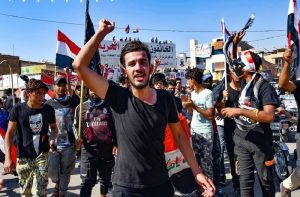 Polls opened at 7:00am (04:00 GMT) on Sunday but few voters turned up early at one polling station at a school in the centre of the Iraqi capital, Baghdad.
Polls opened at 7:00am (04:00 GMT) on Sunday but few voters turned up early at one polling station at a school in the centre of the Iraqi capital, Baghdad.
“I have come to vote to change the country for the better, and to change the current leaders who are incompetent,” said Jimand Khalil, 37, who was one of the first to cast her vote. “They made a lot of promises to us but didn’t bring us anything.”
Security was tight in the capital, with voters searched twice at the entrance to polling stations.
Airports have been closed until dawn on Monday across Iraq, where despite the government’s declaration of victory over the ISIL (ISIS) group in late 2017, sleeper cells continue to mount attacks.
“Iraqis should have the confidence to vote as they please, in an environment free of pressure, intimidation and threats,” the UN mission in Iraq said ahead of the polls.
Polls remain open until 6:00pm, with preliminary results expected within 24 hours of closing. Dozens of election observers deployed by the European Union and the United Nations were set to monitor the vote.
Prime Minister Mustafa al-Kadhimi cast his ballot early in Baghdad’s fortified Green Zone.
“This is an opportunity for change,” he said.
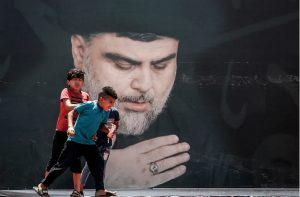 “Get out there and vote, change your reality, for Iraq and for your future,” urged al-Kadhimi, whose political future hangs in the balance, with few observers willing to predict who will come out on top after the lengthy backroom haggling that usually follows Iraqi elections.
“Get out there and vote, change your reality, for Iraq and for your future,” urged al-Kadhimi, whose political future hangs in the balance, with few observers willing to predict who will come out on top after the lengthy backroom haggling that usually follows Iraqi elections.
Analysts have predicted a record-low turnout for the polls, held a year early in a rare concession to the youth-led protest movement.
Dozens of anti-government activists have been killed, kidnapped or intimidated over the last two years, with accusations that pro-Iran armed groups, many of which are represented in parliament, have been behind the violence.
Reporting from Baghdad, Al Jazeera’s Mahmoud Abdelwahed said the expectations of low turnout are widely based on disillusionment among people, especially the youth.
“Most of the disillusioned are those who rose up against corruption and mismanagement in 2019 in what is known as the Tishreen (October) revolution,” he said.
Tens of thousands of demonstrators took to the streets in October 2019 to express their anger at corruption, unemployment and crumbling public services, and hundreds lost their lives in protest-related violence.
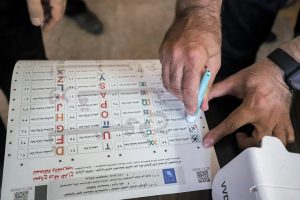 The protests have largely fizzled out as anger has given way to disillusion.
The protests have largely fizzled out as anger has given way to disillusion.
“The people are boycotting the elections because they say it is not bringing any change; it is still producing the same old parties despite the fact that the same old parties have been reshuffling their candidates,” Abdelwahed said.
“Nothing will change. This election will be won by the same factions that people protested against,” 45-year-old Baghdad day laborer Mohammed Kassem, who did not intend to vote, told the AFP news agency.
‘Musical chairs’
At least 167 parties and more than 3,200 candidates are competing for Iraq’s 329 seats in parliament, according to the country’s election commission.
Iraqi elections are often followed by months of protracted negotiations over a president, a prime minister and a cabinet.
A new single-member constituency system for electing Iraq’s politicians is supposed to weaken the power of the traditional blocs largely based on religious, ethnic and clan affiliations but most analysts believe it will make the political process even less accountable.
Officials say a new voting law, also a response to protester demands will help independent, pro-reform candidates, but that will depend on turnout.
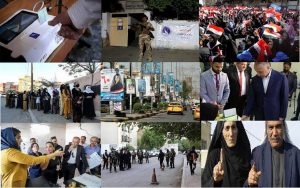 Many Iraqis say they will boycott the vote. They view the democratic system ushered in after the US invasion as flawed and serving only the political parties that have dominated the state since then.
Many Iraqis say they will boycott the vote. They view the democratic system ushered in after the US invasion as flawed and serving only the political parties that have dominated the state since then.
The electoral commission said it expects to publish preliminary results within 24 hours of the close of polls.
It will likely take longer for the balance of power to emerge as the leading factions compete for the support of a larger number of independents.
The Fateh Alliance, the bloc representing many Iran-backed Shia militias, is expected to retain its share of seats.
The list of populist leader Muqtada al-Sadr, already the largest in the outgoing parliament, is expected to make gains but not enough to dominate the Shia camp.
“The elections will likely result in another fragmented parliament, followed by opaque, corrupt horse-trading among factions to form the next government,” said researchers Bilal Wahab and Calvin Wilder in an analysis published by the Washington Institute.
“Few expect this election to amount to more than a game of musical chairs, and the (October 2019 protest) movement’s core demands, curbing systemic corruption, creating jobs and holding armed groups accountable are unlikely to be met.” (Al Jazeera)
 Pressmediaofindia
Pressmediaofindia
